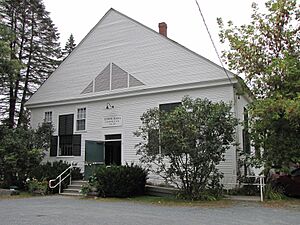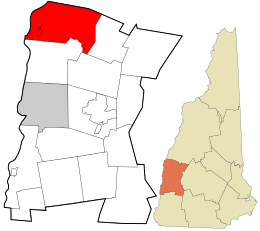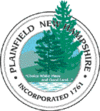Plainfield, New Hampshire facts for kids
Quick facts for kids
Plainfield, New Hampshire
|
||
|---|---|---|

|
||
|
||

Location in Sullivan County and the state of New Hampshire.
|
||
| Country | United States | |
| State | New Hampshire | |
| County | Sullivan | |
| Incorporated | 1761 | |
| Villages |
|
|
| Area | ||
| • Total | 53.0 sq mi (137.2 km2) | |
| • Land | 52.2 sq mi (135.3 km2) | |
| • Water | 0.7 sq mi (1.9 km2) 1.40% | |
| Elevation | 522 ft (159 m) | |
| Population
(2020)
|
||
| • Total | 2,459 | |
| • Density | 47/sq mi (18.2/km2) | |
| Time zone | UTC-5 (Eastern) | |
| • Summer (DST) | UTC-4 (Eastern) | |
| ZIP Codes |
|
|
| Area code(s) | 603 | |
| FIPS code | 33-62340 | |
| GNIS feature ID | 0873700 | |
Plainfield is a town in Sullivan County, New Hampshire, in the United States. In 2020, about 2,459 people lived here. Plainfield is special because it has the Helen Woodruff Smith Bird Sanctuary and the Annie Duncan State Forest.
The main village of Plainfield is a small community. About 178 people lived there in 2020. It is located along New Hampshire Route 12A. Another village in Plainfield is Meriden. This is where Kimball Union Academy, a private school that prepares students for college, is located.
Contents
History of Plainfield
Plainfield was first settled by a group of people from a town called Plainfield in Connecticut. It became an official town in 1761. This happened when Benning Wentworth was the governor of the Thirteen Colonies. King George III had just started his rule.
A part of Plainfield, known as "Meriden Parish," was named after a farm belonging to Massachusetts Governor Jonathan Belcher. This area became home to Kimball Union Academy, which was built in 1813.
Plainfield is also known for being part of the Cornish Art Colony. This was a group of artists who lived and worked in the area between 1885 and 1930. A famous artist named Maxfield Parrish painted a stage backdrop in the Plainfield Town Hall. Parrish moved to Plainfield in 1898 when he was 28 years old. He designed and built his home, called The Oaks, and also a studio. He lived in Plainfield for 67 years.
In 1910, Ernest Harold Baynes started the Meriden Bird Club. This was the first club of its kind in the entire country, showing how much people in Plainfield cared about nature.
Geography and Location
Plainfield covers about 137.2 square kilometers (about 53 square miles). Most of this area is land, with a small part (1.40%) being water. The Connecticut River forms the western border of the town.
Plainfield has several brooks, like Blood's Brook and Blow-me-down Brook, which help drain the land. Great Brook, another stream, flows into the Mascoma River. Croydon Mountain is a high ridge on the eastern side of the town. The highest point in Plainfield is Grantham Mountain, which is about 811 meters (2660 feet) above sea level.
How to Get Around Plainfield
Two main state roads cross Plainfield. Route 12A goes through the western part of town, including Plainfield village. It connects north to West Lebanon and south to Claremont. Route 120 passes through Meriden in the eastern part of town. It leads north to Lebanon and south to Claremont.
Neighboring Towns
Plainfield shares its borders with several other towns:
- Lebanon (to the north)
- Enfield (to the northeast)
- Grantham (to the east)
- Croydon (to the southeast)
- Cornish (to the south)
- Windsor, Vermont (to the southwest at one point)
- Hartland, Vermont (to the west)
Plainfield's Population
| Historical population | |||
|---|---|---|---|
| Census | Pop. | %± | |
| 1790 | 1,024 | — | |
| 1800 | 1,435 | 40.1% | |
| 1810 | 1,463 | 2.0% | |
| 1820 | 1,460 | −0.2% | |
| 1830 | 1,581 | 8.3% | |
| 1840 | 1,552 | −1.8% | |
| 1850 | 1,392 | −10.3% | |
| 1860 | 1,620 | 16.4% | |
| 1870 | 1,589 | −1.9% | |
| 1880 | 1,372 | −13.7% | |
| 1890 | 1,173 | −14.5% | |
| 1900 | 1,114 | −5.0% | |
| 1910 | 987 | −11.4% | |
| 1920 | 853 | −13.6% | |
| 1930 | 858 | 0.6% | |
| 1940 | 970 | 13.1% | |
| 1950 | 1,011 | 4.2% | |
| 1960 | 1,071 | 5.9% | |
| 1970 | 1,323 | 23.5% | |
| 1980 | 1,749 | 32.2% | |
| 1990 | 2,056 | 17.6% | |
| 2000 | 2,241 | 9.0% | |
| 2010 | 2,364 | 5.5% | |
| 2020 | 2,459 | 4.0% | |
| U.S. Decennial Census | |||
In 2010, there were 2,364 people living in Plainfield. There were 923 households, which are groups of people living together. Most of the people (98.0%) were white. A small number were African American, Native American, or Asian. About 1.1% of the population identified as Hispanic or Latino.
About 32.3% of households had children under 18 living with them. Most households (63.5%) were married couples living together. The average household had about 2.51 people.
The median age in Plainfield was 45.2 years. This means half the people were older than 45.2, and half were younger. About 22.8% of the population was under 18 years old.
Notable People from Plainfield
Many interesting people have lived in or had connections to Plainfield:
- Ethel Barrymore (1879–1959), a famous actress who spent summers here.
- Ben Cherington (born 1974), a leader in professional baseball.
- Kathryn Woodman Leighton (1875–1952), a talented artist.
- Dennis Meadows (born 1942), a former director at UNH Institute for Policy and Social Science Research.
- Donella Meadows (1941–2001), a farmer, writer, and MacArthur Fellow, known for her book The Limits to Growth.
- Willard Metcalf (1858–1925), an impressionist painter who lived here seasonally.
- Maxfield Parrish (1870–1966), a well-known artist and illustrator.
- Will Sheff (born 1976), a musician.
- Ellen Biddle Shipman (1869–1950), a landscape architect.
- Hollis Smith (1800–1863), a businessman and Canadian politician.
- Peter C. Whybrow, an author and psychiatrist.
Images for kids
See also
 In Spanish: Plainfield (Nuevo Hampshire) para niños
In Spanish: Plainfield (Nuevo Hampshire) para niños






